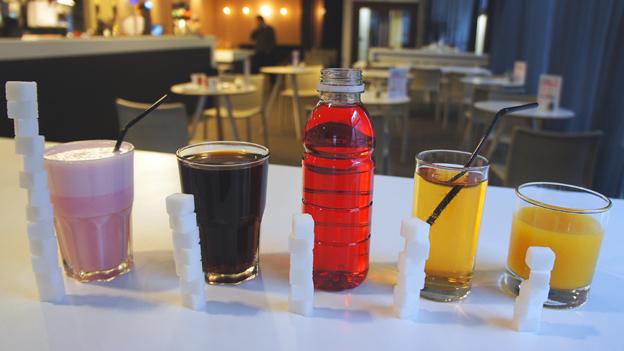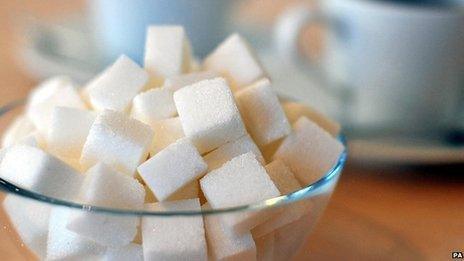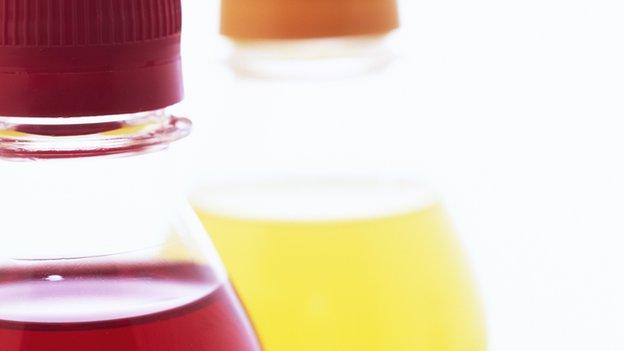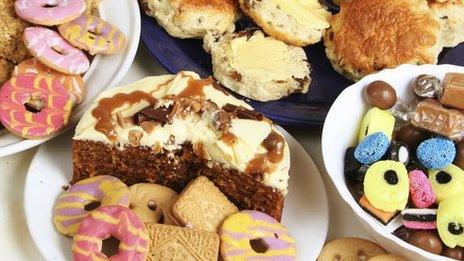Poll shows most want sugary drinks banned from UK schools
- Published
- comments

Many fruit juices and other drinks contain substantial amounts of sugar
Two thirds of people support a ban on sugary drinks in all UK schools and academies, suggests a poll carried out for the BBC.
The Populus poll of 1,000 adults in Britain also found more than four out of 10 people would support a tax on sugary drinks.
And 59% said warnings on packaging - similar to those on cigarettes - would encourage them to eat more healthily.
Sugar industry representatives said demonising sugar was too "simplistic".
The poll - which was carried out for BBC 5Live's Richard Bacon programme - suggests a majority of people in the UK take a harder line on sugary foods and drinks in schools than government policy, which bans the sale of fizzy drinks, crisps and sweets in local authority-run schools, but leaves the decision of whether children can bring them into schools up to head teachers.
These rules do not apply to academies and free schools which together make up more than half of state secondary schools.
Some heads, including that of one primary school in London, have opted for a complete ban on children bringing in sugary and caffeine-based energy drinks.
'Demonised'
But representatives from the sugar industry say it is being unfairly highlighted as the main cause of health problems, in particular obesity.
Dr Julian Cooper, head of food science at AB Sugar, told the BBC: "It's quite simplistic just to demonise one ingredient to the exclusion of all others. We would say that we're probably consuming too many calories and probably doing too little exercise and activity.
"There is probably an over consumption of all calories; not sugar per se."
He added: "There are some products that potentially you can reduce sugar, there's no doubt about it.
"So say for example a tomato sauce that you use for making pasta: if you look at the total sugars in that product, over 90% of the sugars come from the tomatoes.
"So, yes you may have a potential to say 'let's take the 10% out' - once you go below that figure you're starting to remove the tomatoes and personally I actually like tomatoes in my tomato sauce on my pasta."
Under government policy schools under local authority control can only supply drinks listed on a drinks table , externaland states that schools should "remove drinks which have no nutritional value and can cause tooth decay" and should "encourage children to drink water or drinks such as milk and fruit or vegetable juices, which provide important nutrients like calcium, vitamin C and carotenoids".
These food standards do not apply to academies, free schools or to private schools - although they will do from later on this year.
Food choices
But the 5Live poll suggests most adults support a tougher line, wanting to see a total ban on such food in all schools.
And three quarters supported fixed limits on the amount of sugar used in certain foods, with 60% saying they wanted supermarkets to stop promotions on unhealthy food products.
Coca Cola Europe boss James Quincey confronted by Newsnight's Jeremy Paxman in November 2013
But Dr Alison Tedstone, a nutritionist at Public Health England, said more schools would soon come under the same guidelines:
"Actually academies from this year will have the same guidance around food as local authority run schools and so the majority of them are captured by this guidance."
A spokesman for industry body the Food and Drink Federation said: "The food and drink industry is committed to supporting improvements in public health.
"Whether through labelling, education, reformulating old favourites or creating new healthier options, food and drink manufacturers have invested in a wide range of measures to empower and enable consumers to make food choices appropriate to their lifestyle.
"Having eliminated artificial transfats and substantially reduced levels of saturated fat and salt in a wide range of products, many manufacturers are now looking at how they can help consumers to reduce their calorie intake through a wide range of innovative approaches."
- Published5 March 2014

- Published1 November 2013

- Published6 March 2014
- Published17 January 2014

- Published9 January 2014
- Published5 March 2014
